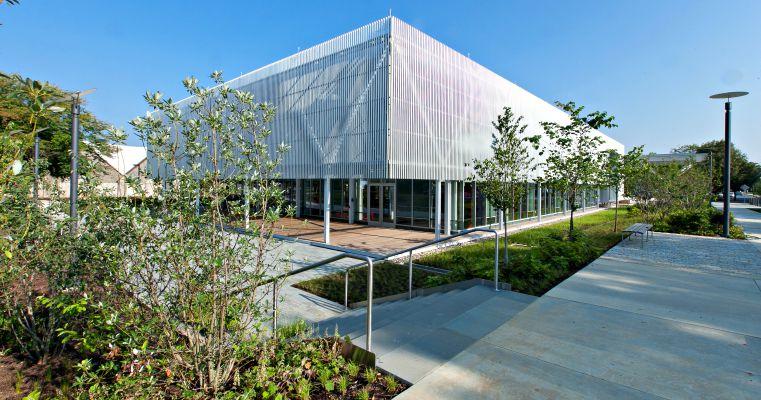Green Honors

Last year, Dickinson opened the 29,251-square-foot Kline Fitness Center expansion, slated to be the sixth LEED-gold-certified facility on campus. Photo by Carl Socolow '77.
Dickinson is one of only 24 colleges to be named to The Princeton Review's Green Honor Roll
by Christine M. Dugan
The College Farm. The Center for Sustainability Education. Alliance for Aquatic Resource Monitoring. Climate Action Plan. LEED. The Handlebar. Biodiesel. Bicycle Friendly University.
These are just a few of the many examples of what makes Dickinson one of the most sustainability-minded colleges in the nation. They also happen to be a few of the examples cited by The Princeton Review of why Dickinson is one of the 24 schools from across the nation to be named to its 2016 Green Honor Roll.
The Princeton Review scored 860 institutions to measure their commitment to the environment in education programs, policies and practices; only schools that received a score of 99, the highest possible rating, make the honor roll.
Other schools that made the list include Harvard, Stanford and Cornell universities, University of California–Berkeley, University of Maryland at College Park, Georgia Institute of Technology and Middlebury College.
Staying power
Green Honor Roll institutions must show healthy and sustainable strength in three core areas: campus life, an overall commitment to environmental issues and preparation of students for employment and citizenship in a world defined by environmental challenges. Other areas probed include energy use, recycling, food, buildings and transportation as well as academic offerings and sustainability-related action plans.
“Though Dickinson College has garnered several national awards and recognitions for incorporating sustainability into its academic programs and campus operations, Dickinson isn’t ready to rest on its laurels," reads The Princeton Review's entry on Dickinson. "The school is always on the lookout for ways it can improve sustainability on campus and in its students’ lives.”
Campus as Laboratory
Dickinson students use the campus as a living laboratory to gain hands-on experience addressing and solving sustainability issues. They conduct sustainability research with faculty, grow food for campus consumption at Dickinson’s organic farm, work with community groups monitoring and protecting water quality and live cooperatively in the Center for Sustainable Living (aka the Treehouse). At Dickinson, students don’t just participate, they initiate—by developing programs such as the student-led Idea Fund, designing and installing solar energy arrays, turning waste vegetable oil into biodiesel fuel, promoting biking through the student-run Handlebar bike cooperative and organizing campus energy challenges.
The college also presents its own award for environmental leadership. The Sam Rose ’58 and Julie Walters Prize at Dickinson College for Global Environmental Activism was established to focus attention on the need to reduce the impact of human lives on the planet. The current recipient—actor and activist Mark Ruffalo—will come to campus during the 2015-16 academic year for a short residency.
Dickinson offers more than 100 sustainability-related courses each academic year that help students gain knowledge about sustainability concepts, problems and solutions while building competencies and dispositions for creating a sustainable world. These courses have been integrated throughout the Dickinson curriculum and more than 39 academic departments.
Good as Gold
Another way Dickinson’s commitment to sustainability is on display is through Leadership in Energy and Environmental Design (LEED) certification of its buildings. The Durden Athletic Training Center, The Center for Sustainable Living, the Rector Science Complex, Waidner Admissions House and Althouse Hall have all earned LEED Gold certification, the second highest level. Last year, Dickinson opened the 29,251-square-foot Kline Center, slated to be the sixth LEED Gold-certified facility on campus, which offers athletes and non-athletes alike a sleek, environmentally friendly destination.
Last week, the Association of the Advancement for Sustainability in Higher Education gave Dickinson its STARS 2.0 Gold rating, a designation shared by a very small number of colleges nationwide. This marks the third time Dickinson has been named Gold through AASHE's Sustainability Tracking, Assessment & Rating System (STARS), a transparent, self-reporting framework for colleges and universities to measure their sustainability performance.
Dickinson's curricular innovations and its leadership in sustainable campus operations consistently earn national recognition. Sierra magazine has named Dickinson a “Cool School,” and the college garnered top marks on the Green Report Card of the Sustainable Endowments Institute. Dickinson earned Second Nature's inaugural award for Institutional Excellence in Climate Leadership and the League of American Bicyclists gave the college a “silver” rating as a Bicycle Friendly University.
Learn More
- Here's why Dickinson College is one of the greenest colleges in America
- "Gold STARS All Around"
- "Water Works"
- "Urbanatural Living, Digital-Style"
- Sustainability at Dickinson
- Latest News
Published August 5, 2015